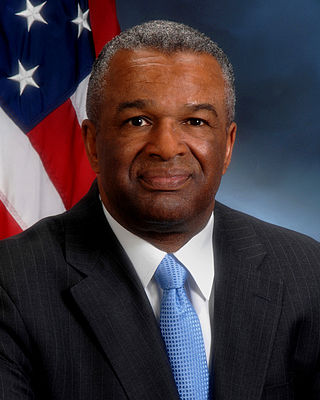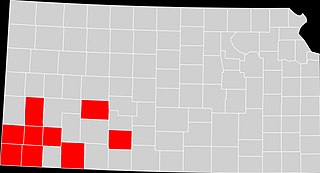Secession is the formal withdrawal of a group from a political entity. The process begins once a group proclaims an act of secession. A secession attempt might be violent or peaceful, but the goal is the creation of a new state or entity independent of the group or territory from which it seceded. Threats of secession can be a strategy for achieving more limited goals.

The State of Jefferson is a proposed U.S. state that would span the contiguous, mostly rural area of southern Oregon and Northern California, where several attempts to separate from Oregon and California, respectively, have taken place. The region encompasses most of Northern California's land but does not include San Francisco or other Bay Area counties that account for the majority of Northern California's population.
Separatism is the advocacy of cultural, ethnic, tribal, religious, racial, governmental, or gender separation from the larger group. As with secession, separatism conventionally refers to full political separation. Groups simply seeking greater autonomy are usually not considered separatists. Some discourse settings equate separatism with religious segregation, racial segregation, or sex segregation, while other discourse settings take the broader view that separation by choice may serve useful purposes and is not the same as government-enforced segregation. There is some academic debate about this definition, and in particular how it relates to secessionism, as has been discussed online.
The wise use movement in the United States is a loose-knit coalition of groups promoting the expansion of private property rights and reduction of government regulation of publicly held property. This includes advocacy of expanded use by commercial and public interests, seeking increased access to public lands, and often opposition to government intervention. Wise use proponents describe human use of the environment as "stewardship of the land, the water and the air" for the benefit of human beings. The wise use movement arose from opposition to the mainstream environmental movement, claiming it to be radical.

Ronald Cordell Sims is the former Deputy Secretary of the United States Department of Housing and Urban Development, having served in the position from May 8, 2009 to July 2011. He is also the former King County Executive. Sims ran unsuccessfully for higher office twice: United States Senator in 1994 and for Governor of Washington in 2004.
Regionalism is a political ideology that seeks to increase the political power, influence and self-determination of the people of one or more subnational regions. It focuses on the "development of a political or social system based on one or more" regions and/or the national, normative or economic interests of a specific region, group of regions or another subnational entity, gaining strength from or aiming to strengthen the "consciousness of and loyalty to a distinct region with a homogeneous population", similarly to nationalism. More specifically, "regionalism refers to three distinct elements: movements demanding territorial autonomy within unitary states; the organization of the central state on a regional basis for the delivery of its policies including regional development policies; political decentralization and regional autonomy".
There have been various movements within Canada for secession.

Skykomish County was a county proposed to be carved out of Snohomish and King Counties in Washington state, United States. The name comes from the Skykomish River, which flows through the proposed county's boundaries.

The State of Superior is a proposed "51st state" that would be created by the secession of the Upper Peninsula from the rest of Michigan, named for adjacent Lake Superior. Some proposals would also incorporate territory from the northern Lower Peninsula, northern Wisconsin, and even Minnesota. The proposals are spurred by cultural differences, geographic separation from Lower Michigan, and a belief that the problems of the "Superior Region" are ignored by distant state governments. When the Northwest Territory was being organized by the fledgling U.S. government, Thomas Jefferson proposed a state which he named Sylvania, including the Upper Peninsula and territory that is now northern Wisconsin and northeastern Minnesota. The idea has gained serious attention at times, but faces substantial practical obstacles.

The Cascadia movement is a bioregional independence movement based in the Cascadia bioregion of western North America. Potential boundaries differ, with some drawn along existing political state and provincial lines, and others drawn along larger ecological, cultural, political, and economic boundaries.

The Whatcom County Library System (WCLS) is a public library service for residents of Whatcom County, Washington. It has 10 library branches, a bookmobile, and other programs.

The Republic of Lakotah or Lakotah is a proposed independent republic in North America for the Lakota people. The idea of an independent nation of the Lakota was advanced in 2007 by activist Russell Means and the Lakota Freedom Movement. The suggested territory would be an enclave within the borders of the United States, covering thousands of square miles in North Dakota, South Dakota, Nebraska, Wyoming, and Montana. The proposed national borders are those laid out in the 1851 Treaty of Fort Laramie between the United States government and the Lakota tribes. These lands are now occupied by Indian reservations and non-Native settlements.

In the context of the United States, secession primarily refers to the voluntary withdrawal of one or more states from the Union that constitutes the United States; but may loosely refer to leaving a state or territory to form a separate territory or new state, or to the severing of an area from a city or county within a state. Advocates for secession are called disunionists by their contemporaries in various historical documents.

California, the most populous state in the United States and third largest in area after Alaska and Texas, has been the subject of more than 220 proposals to divide it into multiple states since its admission to the Union in 1850, including at least 27 significant proposals prior to the 21st century.

The government of Cook County, Illinois, is primarily composed of the Board of Commissioners, other elected officials such as the Sheriff, State's Attorney, Treasurer, Board of Review, Clerk, Assessor, Cook County Circuit Court judges and Circuit Court Clerk, as well as numerous other officers and entities. Cook County is the only home rule county in Illinois. The Cook County Code is the codification of Cook County's local ordinances.

West Kansas was a proposed state of the United States, advocated by a short-lived secessionist movement in the 1990s. This movement was in reaction to a 1992 school finance law that disadvantaged rural schools. The proposed state would have consisted of nine counties from south-western Kansas.

Yes California is a Californian political action committee that promotes the Independence of the state of California from the United States.











